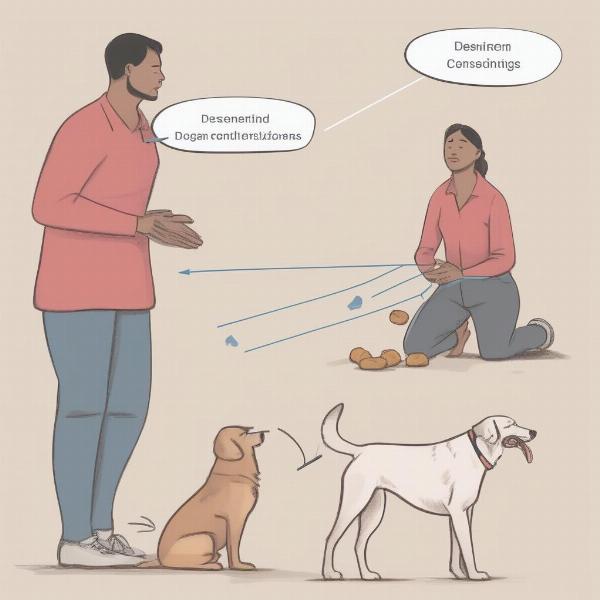Turning a reactive, fearful, or aggressive dog into a well-adjusted companion requires patience, understanding, and a commitment to positive reinforcement methods. This transformation, turning the “mad dog” into a “genteel lord,” isn’t about suppressing unwanted behaviors, but about building trust, confidence, and a positive association with the world around them. It’s about understanding the root cause of the behavior and addressing it with compassion and consistency.
Understanding the “Mad Dog”
Before embarking on this journey, it’s crucial to understand what’s driving the undesirable behavior. Is it fear, anxiety, a lack of socialization, or a past traumatic experience? A “mad dog” isn’t inherently bad; they are often communicating distress or discomfort in the only way they know how. A thorough veterinary check-up is the first step to rule out any underlying medical conditions that could be contributing to the problem.
Building Trust and Confidence
Once medical issues are ruled out, the focus shifts to building a strong foundation of trust and confidence. This involves creating a safe, predictable environment for your dog. Establish a clear routine for feeding, walks, and playtime. Use positive reinforcement techniques, such as rewarding calm behavior with treats, praise, or toys. Avoid punishment, as it can exacerbate fear and aggression.
The Power of Positive Reinforcement
Positive reinforcement is the cornerstone of transforming a reactive dog. It teaches the dog that good things happen when they exhibit desired behaviors. Start small, rewarding even the slightest hint of progress. For example, if your dog is fearful of strangers, reward them for simply looking at a stranger without reacting.
Addressing Specific Behaviors
Different behaviors require different approaches. For a dog that barks excessively, teach them a “quiet” command and reward them for remaining silent. For a dog that lunges at other dogs, desensitization and counter-conditioning are key. This involves gradually exposing the dog to the trigger (other dogs) at a safe distance while pairing the exposure with something positive, like treats or praise.
 Dog Training: Desensitization and Counter-Conditioning
Dog Training: Desensitization and Counter-Conditioning
Seeking Professional Help
Don’t hesitate to seek professional help from a certified dog trainer or behaviorist. They can assess your dog’s individual needs and develop a tailored training plan. A professional can also provide guidance and support throughout the process, helping you navigate challenges and celebrate successes.
From Mad Dog to Genteel Lord: A Journey of Patience and Love
Turning a reactive dog into a well-adjusted companion is a journey, not a destination. It requires patience, consistency, and a deep understanding of your dog’s needs. But with the right approach and a commitment to positive reinforcement, you can help your “mad dog” blossom into a “genteel lord,” a confident and loving member of your family.
FAQ
- How long does it take to change a dog’s behavior? The timeframe varies depending on the dog, the severity of the behavior, and the consistency of training. It can take weeks, months, or even longer.
- Is it ever too late to train a reactive dog? It’s never too late to start training. Older dogs can learn new behaviors, just like puppies.
- What are some common triggers for reactive dogs? Common triggers include other dogs, strangers, loud noises, and sudden movements.
- Can medication help with reactivity? In some cases, medication can be used in conjunction with behavior modification to help manage anxiety and reactivity.
- What if my dog bites someone? If your dog bites someone, seek professional help immediately from a veterinarian and a certified behaviorist.
Related Articles on ILM Dog
ILM Dog is your trusted resource for expert advice on dog care and training. We provide practical, reliable information on all aspects of dog ownership, from breed selection and healthcare to nutrition and behavior modification. We are passionate about helping you create a strong bond with your canine companion. Contact us today to learn more about our services! Email: [email protected], Phone: +44 20-3965-8624. Visit ILM Dog for all your dog care needs.